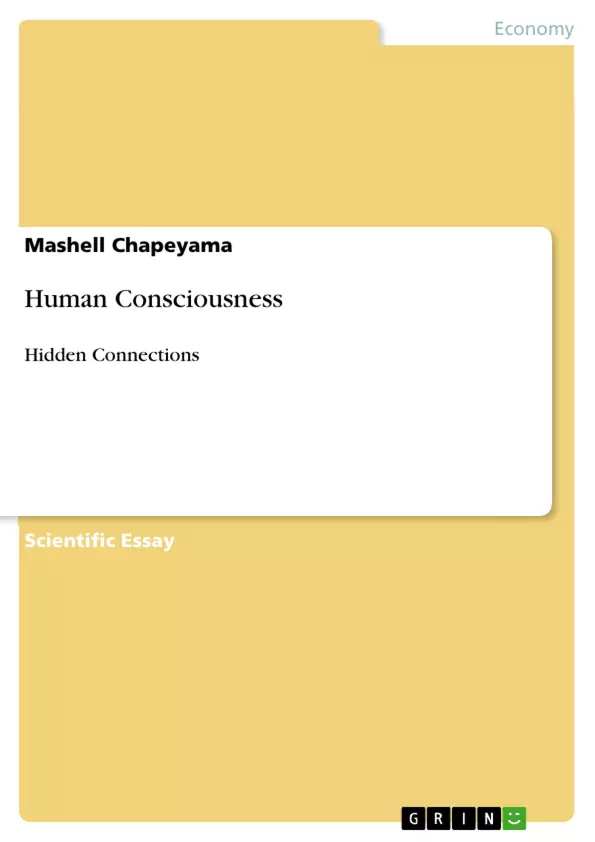The two essays look at how people relate to their social, political, and their surroundings. The gist of these two essays is that people must be more aware of themselves and the systems that they live in such as the religious, political, social and economic ones. People must be aware of their biological selves. The essence of self-introspection on individual and social levels have been touched on. Human beings must be more aware of themselves and how best they can fit into wider society and their environment. This also calls for the need to undergo transformation in order to sustain themselves and to live sustainably. The issue of the natural environment has been discussed as well. Human race must assist is creating a sustainable environment. They must no only be aware of their current scenario, but also focus on the future of mankind.
Inhaltsverzeichnis (Table of Contents)
- The Hidden Connections: The Philosophy of Sustainability
- Introduction
- Capra's Vision of Sustainability
- The Importance of Interdependence
- The Three Connecting Dimensions: Social, Cognitive, and Biological
- Defining Sustainability
- Understanding the Biological Dimension
- Exploring the Cognitive Dimension
- Defining the Social Dimension
- Interconnectivity of the Three Dimensions
- Lessons from Nature
- Theory of Cognition: Capra's Perspective
- Conclusion
Zielsetzung und Themenschwerpunkte (Objectives and Key Themes)
This book explores Capra's philosophy of sustainability, focusing on the interconnectedness of social, cognitive, and biological dimensions. It aims to provide practical guidelines for creating and maintaining a sustainable future for current and future generations. Capra emphasizes the importance of learning from nature and adapting to it, highlighting the role of interdependence in achieving sustainability.
- The concept of sustainability and its practical implications.
- The interconnectedness of social, cognitive, and biological dimensions in achieving sustainability.
- The importance of learning from nature and adapting to its principles.
- The role of interdependence in creating a sustainable future.
- The theory of cognition and its implications for human behavior and decision-making.
Zusammenfassung der Kapitel (Chapter Summaries)
- The first chapter introduces Capra's vision of sustainability and emphasizes the importance of interdependence and learning from nature.
- The second chapter delves into the three connecting dimensions: social, cognitive, and biological. It defines sustainability and explores each dimension in detail, demonstrating their interconnectedness.
- The third chapter discusses the lessons we can learn from nature, emphasizing the need for integration and co-existence in other spheres of existence.
- The fourth chapter focuses on the theory of cognition, comparing Capra's perspective to traditional views. It highlights the influence of the environment and social context on human thought processes and decision-making.
Schlüsselwörter (Keywords)
The book delves into key concepts such as sustainability, interdependence, social, cognitive, and biological dimensions, lessons from nature, theory of cognition, and the interconnectedness of human systems with the environment. These themes are explored through the lens of Capra's philosophy, emphasizing the importance of learning from nature to achieve a sustainable future for all.
Frequently Asked Questions
What is Capra's philosophy of sustainability?
It focuses on the interconnectedness of social, cognitive, and biological dimensions and emphasizes learning from nature to create a sustainable future.
Why is interdependence important for sustainability?
Interdependence highlights that all living systems are linked; understanding these connections is crucial for individual and social transformation.
What are the three connecting dimensions mentioned?
The three dimensions are the social (human systems), cognitive (thought and behavior), and biological (physical life) dimensions.
How does the theory of cognition relate to human behavior?
Capra's theory suggests that our environment and social context significantly influence our thought processes and decision-making regarding the future.
What can we learn from nature according to this book?
Nature provides lessons on integration, co-existence, and sustainable cycles that humans must adapt to ensure long-term survival.
- Quote paper
- Mashell Chapeyama (Author), 2010, Human Consciousness, Munich, GRIN Verlag, https://www.grin.com/document/174285



